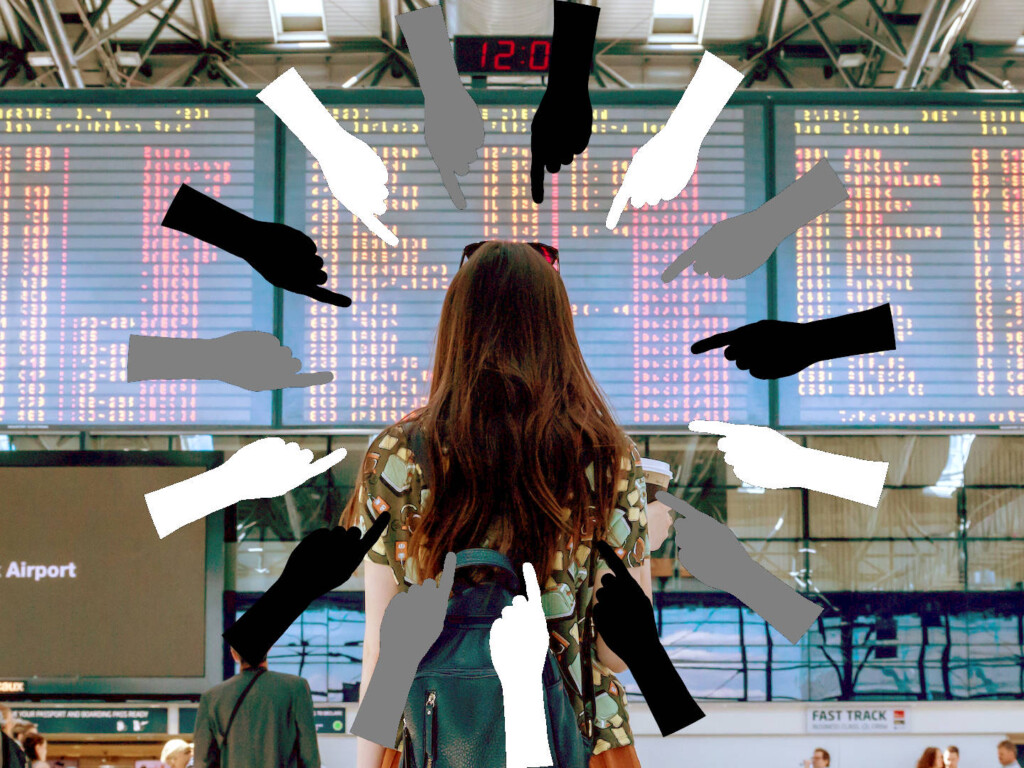What does it mean to be critical of tourism?

Some “GT” readers are critical of tourism, particularly ‘mass tourism’. Some in the universities see themselves as part of a ‘Critical Tourism Studies’ movement. But what does it mean to be ‘critical’ in relation to modern tourism?
It’s a “Good Tourism” Insight Bites question.
Your correspondent put the question to the travel & tourism stakeholders in the “GT” network, inviting responses of no more than 300 words. (You too can join the “GT” network. Register.)
Thanks to the 18 respondents — professors, professionals, practitioners — who took the time to share their thoughts on the question. Their answers appear in the order received.
Bites menu
- The ‘geography of hope’
- The ‘responsibility mindset’
- ‘Tourism academics are tourists too’
- To be critical of tourism is to be ‘farsighted and visionary’
- ‘We should all be critical’ … including of the critics
- Offer sustainable, responsible, enjoyable alternatives
- ‘Stay alert, flexible, and … critical’
- ‘Tourism done well is a force for good’
- ‘Towards a more equitable and inclusive model of tourism’
- Counter the backlash with ‘high-yield tourism’
- The debate must be ‘robust’
- Others’ opinions ‘often viewed as existential threats’
- Distinguish between ‘critical supply’ and ‘critical demand’
- ‘Hedonism is no match for hurricanes’
- ‘A more collaborative dialogue’ needed
- ‘We can be constructive in our criticism’
- Being a tourist is ‘fraught with contradictions’
- ‘Scholars, we should direct our critical gaze to our own actions’
- “GT” Insight BiteX (‘X’ is up to you)
- What do you think?
- Featured image (top of post)
- Previous “GT” Insight Bites
The ‘geography of hope’
C Michael Hall, Professor, University of Canterbury, New Zealand
I have always had some misgivings about the critical tourism studies ‘movement’ with respect to what it really means.

To me it is a broad church which has helped bring some other voices to the tourism table, especially from feminist and, perhaps to a lesser extent, QueerLGBT+ perspectives, which is certainly to be welcomed.
However, I have been concerned that it has just become a byword for qualitative research or, to be more accurate, non- or anti-quantitative research, which is not necessarily critical at all.
In fact, quantitative research, especially the use of space-time driven statistics, can sometimes be among the best ways to highlight various forms of injustice or undesirable environmental effects.
For me critical tourism research rests on two things:
First, it builds on, even if indirectly, critical theory. This means at least acknowledging the centrality of structure in people’s everyday lives and practices — including tourism of course — and its role in affecting individual agency.
The second element is that of giving effect to the emancipatory possibilities of both tourism and tourism research, which means focusing on issues of social, economic, and environmental justice and inequality.
For me the synthesis of these two elements must lead one to a third concern, which is that of the role, exercise, and (mis)use of power in tourism. I don’t think the critical studies movement, with some exceptions, sufficiently engages in this area.
This is especially important because, if one wants teaching and research to be effective, it perhaps means not only ‘speaking truth to power’ but also engaging with power, as well as trying to nudge tourism in a desired direction.
I fully acknowledge that is difficult to do, but for me it is part of what could be described as the ‘geography of hope’ for tourism.
The ‘responsibility mindset’
Robin Boustead, Founder, Great Himalaya Trail, Nepal
Unfortunately, we live in times of hyperbole and exaggeration.

Everyone is ’thrilled’ on linkedin, and apparently tourism is in a ‘critical’ state. No doubt there are academics who are thrilled to be critical.
Tourism is thriving and far from critical as a sector, and its impacts can be both positively and negatively profound. Mass tourism has always existed, even as fashion and fads come and go.
How to guide business owners and travellers into a ‘responsibility mindset’ is the real challenge and that requires positive reinforcement, not criticism.
‘Tourism academics are tourists too’
Melanie Smith, Associate Professor and Researcher, Budapest Business University, Hungary
I used to wonder how Critical Tourism Studies was different from non-critical tourism studies. In theory, educators and practitioners should all be critical thinkers. And we should encourage our students to develop enquiring minds, to question, and critique.
It often seems to be the case that so-called Critical Tourism Studies is more philosophical and theoretical than other forms of tourism studies, e.g. those that are more vocational and managerial.
In tourism theory, we often advocate ’ideal’ scenarios which may or may not be implementable in ’real life’. Yet academics and researchers often complain that industry practitioners do not take their advice seriously, let alone read their journal articles; often impenetrable to non-academic readers.
At the same time, we increasingly find ourselves in the position of being criticised, not only as academics who fail to engage with industry, but also as hypocrites; many of us critical of mass tourism and/or of tourism’s role in climate change, yet frequent flyers in the name of academic research!
Rightly or wrongly, it is ironic to criticise tourism academics, educators, and researchers for their business travel habits. In addition, as one of many academics living abroad, away from family and friends, if I do not travel, I lose personal contact with home (and no, Zoom does NOT fill the gap!)
Of course, we should make more sustainable and ethical choices in our everyday lives and travel plans. But who dictates that and who facilitates it? And where are the limits of our self-sacrifice and altruism?
Give me a quick, direct, and affordable train trip and I will happily take it. But I will hesitate if the train journey involves four changes and takes twice the time and money as a flight.
All of that is to say that tourism academics are tourists too!
To be critical of tourism is to be ‘farsighted and visionary’
Dorji Dhradhul, author and creativist, Bhutan (former Director General, Bhutan Tourism)
To be ‘critical’ of tourism, especially ‘mass tourism,’ means being farsighted and visionary.
Bhutan stands as an example of a nation that has been consistently critical of tourism, particularly on the sustainability front.
Since the inception of tourism in the country in the early 1970s, Bhutan’s tourism policy and practice have been guided by the “High Value Low Volume” approach, prioritising quality over quantity to minimise negative impacts on the environment and local culture. We credit this visionary tourism policy to farsighted leadership from the Golden Throne.
To be critical of tourism is to examine it from various perspectives beyond its economic benefits or surface-level attractions. Critical tourism studies delve into these complexities, aiming to understand and address the broader implications of tourism beyond its promotional narratives.
At its core, being critical of tourism means challenging dominant paradigms and questioning assumptions underlying its development and management, including acknowledging the unequal distribution of benefits and the exploitation of local resources and labour.
Critics also examine the concept of ‘authenticity’ in tourism experiences, arguing that the commodification of culture often leads to the loss of cultural diversity and the erosion of authentic experiences for visitors and locals.
Addressing environmental impacts is crucial; mass tourism can strain ecosystems and exacerbate climate change and biodiversity loss. Sustainable tourism practices minimise negative effects and promote the responsible stewardship of natural resources.
Social impacts are another concern. Overtourism can lead to overcrowding, displacement of residents, and cultural clashes, perpetuating inequalities and marginalising communities.
Critical tourism studies offer a framework for evaluating tourism’s role in society, encouraging ethical engagement and alternative models that prioritise social justice, environmental sustainability, and cultural integrity.
By adopting a critical perspective, scholars and practitioners aim to transform tourism into a more equitable, responsible, and enriching experience for all stakeholders.
‘We should all be critical’ … including of the critics
Jim Butcher, Reader, Canterbury Christ Church University, UK; Tourism’s Horizon: Travel for the Millions
For most people, to be ‘critical’ can mean one of two things: to put forward the reasons why something is wrong or not of a good standard; or to look at something deeply and from different angles.
Critical scholarship, however, stems from ‘critical theory’ and its attempts to uncover the assumptions and structures that perpetuate inequality or poverty. But that has morphed into something else.
The problem to be solved for many of today’s self-styled critical scholars is less society and the limits it imposes on human flourishing, and more the human proclivities that are seen as destructive of the planet and a threat to others.
That leads to a pessimistic, and at times misanthropic take on tourism; a conception of the ‘mass tourist’ as a uniform, mindless consumer lacking individuality or agency; often depicted in “swarms” or “hordes”. Prejudice masquerading as criticism.
Furthermore the starting point for some critical tourism scholars is to ignore the positive cultural and economic legacy of tourism and the liberatory potential of expanded leisure mobility. Instead they have adopted the term ‘overtourism’ as a defining characteristic.
Some who invoke ‘overtourism’ shift seamlessly from capacity problems and a need to assert democratic wishes (fairly uncontentious), to a general sense that all sorts of cultural and natural limits have been surpassed both locally and globally.
Evidently, as it has endeavoured to uncover and critique the assumptions and premises of others, critical scholarship has picked up its own assumptions and premises along the way. These in turn must be critiqued.
Going back to a common definition of critical — looking at something deeply, and from different angles — we should all be critical. These days that may involve being critical of tourism’s critics too.
[Tourism’s Horizon: Travel for the Millions is a valued “GT” Insight Partner. Join them.]
Offer sustainable, responsible, enjoyable alternatives
Melissa Tilling, Founder, Sustainable Journeys, Charitable Travel, and The Charitable Travel Fund, UK
To be critical in relation to modern tourism means to adopt a questioning, holistic, and enabling approach that seeks to understand and address the complex and often problematic aspects of tourism in a transparent way … without ending tourism.

We can take action through constructive product choices rather than being solely evangelical and critical from the sidelines.
Each aspect of sustainability is important. We can present balance to the customer to overcome their obvious confusion about how to make better choices.
More than being simply critical, as we have found so many to be, we can critique the status quo ‘legacy’ holidays and tours and curate travel that seeks to pragmatically deliver more responsible tourism through sustainable journeys that are amazing; holidays that people will want to buy rather than swallow as a ‘bitter pill’.
We can adopt an approach that seeks to advocate for practices and policies that are just, sustainable, and respectful of both people and the planet by being careful about the choices we make for customers.
We can use rail on our journeys where we can, even if only one-way, because we accept that customers may have time or money constraints.
We can give customers the chance to consciously choose better hotels, in-destination transport, positive engagements with the environment, community tourism experiences, low and shoulder season travel etc.
At Sustainable Journeys we challenge the status quo by making it both simple and enjoyable to be a more sustainable and responsible force for positive change.
‘Stay alert, flexible, and … critical’
Wolfgang Georg Arlt, CEO, COTRI (China Outbound Tourism Research Institute); Director, Meaningful Tourism Center, Germany
In the 50 years since the introduction of the Boeing 747, tourism, especially international tourism, has been growing to such an extent that many destinations have gone beyond their carrying capacities, and big businesses have made beach resorts and pedestrian zones in city centres look all too similar.
Some “critical” academics are calling for a complete overhaul of tourism’s economic system built on commodification and growth, and/or they have developed nostalgic concepts such as regenerative tourism to replace the status quo.
They offer many good reasons to end capitalism in general. But, alas, the global revolution seems not to be in sight.
A “critical” understanding of post-pandemic, post-peace, post-stable climate tourism — what I call “Global Tourism 2.0” — has to start from the insight that all that we once knew about tourism is being challenged in our times.
For we are no longer living in a VUCA (volatile, uncertain, complex, and ambiguous) world. There is, for example, no uncertainty at all about the growing impact of climate change in the coming decades, whatever is done from tomorrow, because ‘The Science’ is settled.
We have moved into a Schumpeter world of “creative destruction”. Those destinations and companies and academics who understand that fact accept the inevitable destruction of old forms of tourism (bye bye beach holidays), old business models (bye bye tour operators), and old academic approaches (bye bye individual thought), and embrace the creation of new ones (with and against AI).
It is “critical” tourism praxis to do so.
International leisure tourism will go down together with the global economic system within the next three decades. So stay alert, flexible, and … critical.
‘Tourism done well is a force for good’
Willem Niemeijer, CEO, YAANA Ventures, Thailand
Having observed and participated in the tourism industry’s evolution in Asia over the last 35 years, I agree that the term ‘critical’ in relation to modern tourism holds significant weight.
Critical tourism does not merely involve critiquing the negative impacts of mass tourism; it encompasses a broader and more thoughtful analysis of how tourism interacts with social, cultural, and environmental contexts.
Mass tourism, often characterised by its scale and homogenised experiences, can lead to several adverse effects. Overcrowding, environmental degradation, and cultural insensitivity are just a few issues that have given the tourism industry a bad reputation. Strain on local resources and the displacement of communities are crucial concerns that necessitate a shift in how we approach tourism.
However, to paraphrase Professor Valeria Minghetti, no destination suffers from ‘overtourism’ but from mismanagement. Seen through that lens, we can manage tourism for the benefit of local communities. We can reward longer stays, use digital solutions, incentivise preferred visitors, prioritise locals, and engage in more effective communication.
The Critical Tourism Studies movement within academia can contribute to a more reflective and responsible tourism industry by encouraging stakeholders to think deeply about the ethics and consequences of tourism and related policies.
However, many academics have little or no experience in the business of tourism. They offer ‘solutions’ that are impractical, suggest policies that prohibit development, and deny locals tourism revenues.
Tourism done well is a force for good. The private sector must be involved in seeking practicable solutions to tourism’s problems.
For me and Khiri Travel, being critical means embracing regenerative tourism principles, and championing the 4Cs of The Long Run: Conservation, Community, Culture, and Commerce. By prioritising these values, we can create a more equitable and respectful tourism industry that benefits travellers, the environment, and host communities.
[Khiri Travel and other YAANA-affiliated brands are valued “GT” Partners. Join them.]
‘Towards a more equitable and inclusive model of tourism’
Yesaya Sandang, Lecturer, Universitas Kristen Satya Wacana, Indonesia
To be critical of tourism transcends mere observation; it is a call to action, demanding the elevation of tourism’s impact on humanity and the environment we inhabit.
At its core lies a commitment to harnessing the potential of tourism for the greater good. This entails a dual imperative: first, to integrate the marginalised and disenfranchised into the narrative and fabric of tourism, and second, to scrutinise the underlying political and economic dynamics driving the industry.
Central to this critical lens is the recognition that tourism is not immune to exploitation. Its allure often masks the systemic injustices perpetuated within its framework.
Thus, to truly unlock the transformative power of tourism, we must confront these realities head-on. This requires a thorough examination of the political economy underpinning tourism, laying bare the mechanisms of exploitation and inequality embedded within.
Moreover, being critical of tourism necessitates a commitment to dismantling these structures of injustice, advocating for fair labour practices, environmental stewardship, and equitable distribution of resources within the tourism sector. Such concerted efforts can pave the way for a more just and sustainable future.
In the end, to be critical of tourism is to envision a paradigm shift; a transition towards a more equitable and inclusive model of tourism. It is a journey towards harnessing the potential of tourism as a force for positive change, one that prioritises the well-being of both people and planet.
In this pursuit, the essence of criticality lies not in critique alone but in catalysing tangible progress towards a more just and equitable world.
Counter the backlash with ‘high-yield tourism’
Jens Thraenhart, Founding Partner & CEO, Chameleon Strategies, Thailand
Since 2022, many travel businesses have witnessed a surge in demand, often exceeding pre-pandemic levels. This rebound has been championed by governments to demonstrate economic progress. While economic recovery and growth are essential, a backlash is developing, and public sentiment against mass tourism is hardening in many popular locations.

An emphasis on numerical growth risks side-lining sustainability initiatives, propelling destinations towards a new imbalance, where short-term arrivals overshadow long-term viability. Destinations may remain dependent on a few high-volume source markets, and ignore the needs of high-yield, conscious, and responsible travellers.
High-yield travellers offer an economically advantageous model for destinations and travel organisations. This crucial, yet poorly defined and often-overlooked, segment offers huge potential to re-balance visitor economy growth by creating a bridge between mass and luxury travel. It prioritises visitors who spend more and contribute to the cultural, social, and environmental sustainability of destinations.
Unlike mass or luxury tourism, high-yield tourism nurtures inclusive revenue streams by visitors who contribute as much as they spend. High-yield visitors seek immersive experiences enabling the economic benefits to be effectively dispersed. By focusing on this fast-changing segment, destinations can foster a more equitable form of tourism that supports local businesses and preserves cultural and natural assets.
Neglecting high-yield visitors can result in the adverse effects of overcrowding, such as cultural dilution, environmental harm, and a fragile economic foundation reliant on luxury spending or large visitor volumes. These factors decrease the quality of life for residents and damage a destination’s long-term appeal.
Follow the High-Yield Tourism podcast, which Gary Bowerman and I jointly host. Find us on Spotify and Apple Podcasts, and join the conversation on LinkedIn and Facebook.
The debate must be ‘robust’
Peter Semone, Chair, Pacific Asia Travel Association, Thailand
The Pacific Asia Travel Association (PATA) recently held its Annual Summit in Macau SAR, China under the theme “Reimagining Tourism”. In my opening remarks as Chair, I encouraged attendees to re-imagine how we conceive, plan, and engage in tourism activities.
Being critical cannot simply be about complaining about the way things are. It must also be about seeking ways to transform the entire tourism industry to be more sustainable, responsible, and inclusive.
The debate on how to reshape tourism practices to create a more positive impact on destinations, travellers, communities, and the planet as a whole must be robust. We must recognise both the good and the bad of tourism and imagine ways to nurture the positives and mitigate the negatives.
Others’ opinions ‘often viewed as existential threats’
K Michael Haywood, publisher, ‘Destinations-in-Action’, Canada
Not all of us live in societies that value criticism and tolerance. In fact, in our increasingly polarised societies the opinions of others are often viewed as existential threats, making it difficult for us to listen.
This begs the question: What do we need to do if we hope to educate and edify in more engaging ways?
In some communities and destinations, concerns with tourism‘s dominance and sustainability prompt considerable angst and calls for social change through “understanding and changing tourism [particularly] by locating the phenomenon in its wider political, economic, cultural, and social contexts”.
As the rationale for engaging in Critical Tourism Studies, one might only hope that the academic community along with the media and consulting worlds would:
- Understand tourism from the perspectives of every stakeholder;
- Examine the implications of tourism within different time frames (high to low seasons);
- Assess tourism‘s escapist and immersive qualities through wider political, economic, cultural, and social contexts, utilising varying and often contradictory personal, organisational, local, regional, and national points of view;
- Explain how, what, when, where, and why touristic activities simultaneously create or destroy (functional, sensual, social, natural, life-affirming) value, and how it can be regained and captured for the benefit of all;
- Demonstrate and reveal your expertise, passion, and sensibility for the subject, and the basis for your meaningful judgments;
- Recognise that the role of the critic requires self-criticism through examination of your own reactions and legitimacy (nothing worse than revelling in ridicule and snark);
- Write for the literature of tourism in ways that honour the subject; and
- Review tourism and its active participants and operators fairly and intelligently.
Finally, a reminder: Destinations-in-Action serves to bring critics and practitioners together to share, and to bring great ideas, improvements, and innovations to realisation.
Distinguish between ‘critical supply’ and ‘critical demand’
Valeria Minghetti, Head of Research, CISET (International Centre for Studies on Tourism Economics), Università Ca’ Foscari, Italy
Being ‘critical’ in relation to modern tourism means adopting a critical approach to the analysis of the tourism phenomenon, studying it from different perspectives. It implies a multidisciplinary attitude and the adoption of both quantitative and qualitative methodologies.

But discussing ‘critical tourism’ also means distinguishing between ‘critical supply’ and ‘critical demand’. Sustainability and responsibility are two sides of the same coin: the former must animate businesses and destinations, the latter tourists/same-day visitors.
In the case of businesses and destinations, many critical issues ‘came to a head’ soon after the pandemic, even though they were already present well before.
Tourism does not create problems per se, but it does if it is not included in an overall destination development plan. As a London Development Plan published some 20 years ago very cleverly put it, “we want to be the best destination to live, work, study, invest and do tourism”.
As for tourism demand, the ‘critical visitor’ can be defined in two ways:
- The visitor who carefully analyses what is presented and offered, in what way and for what purpose; and
- The visitor who creates critical situations through his/her behaviour.
The first category of visitor generally observes and criticises, according to their expectations, but also without a negative attitude, and their requirements can have a stimulating effect on improving the offer.
The second category of visitor, on the other hand, creates criticalities. I think that, in the post COVID period, the actions of these visitors were more evident than those of the former, generating negative reactions from residents in some places.
This was probably due, among other things, to the inability of companies and destinations to meet the needs expressed by the analytical visitor, to mitigate the behaviours of the problematic visitor, and to preserve the rights of local communities.
‘Hedonism is no match for hurricanes’
Herb Hiller, Writer & Publisher, The Climate Traveler, USA
A critique of mass tourism; challenging the world of travel to demonstrate a commitment to climate action while still being compensated for its work:
Lodgings, airlines, cruise ship companies, tour operators, travel advisors, destinations, and attractions all prefer to exaggerate what they deliver. Many lack transparency. They employ secrecy as a strategy for protecting profits. Follow the money.
Hotels put up junk fees and fake reviews.
The cruise industry stonewalls about crimes that occur on board vessels that fly flags of convenience.
Companies go rogue on product safety, like Boeing.
Out-of-area investors put up short-term rental compounds that alienate residential communities.
Ministries of tourism, like Jamaica’s, devastate ecosystems for mega-resorts that offer mostly low-paying jobs.
A hotel authority says that 43% of people would rather clean toilets than call a customer service agent.
Tourism needs unity of purpose before the trade can free itself from its dependence on aviation for long and mid-distance leisure travel; the blood and bone of mass tourism.
The World Travel and Tourism Council, the European Travel Commission, and regional counterparts everywhere need to invite climate scientists, triple bottom line economists, and leading tourism and hospitality schools to help the travel industry re-imagine and implement strategies so that travel & tourism can be reframed with a climate purpose while — always enjoyably — keeping us all traveling.
The Atlantic hurricane season starts on June 1. Are we ready for 17-to-25 named storms, including four-to-seven major hurricanes that will bring six months of anxiety, direct hits, and devastation to our screens?
Hedonism is no match for hurricanes. To be critical of mass tourism is to heal our planetary home by replacing outdated paradigms with outlooks that redress our times.
‘A more collaborative dialogue’ needed
John Black, General Manager for Cambodia and Laos, Khiri Travel
Being critical in relation to modern tourism can mean a variety of things, including that those involved in these discussions hold a conscious concern for the impacts that tourism can have on economies, infrastructure, environment, equality, culture, and society.

Critical studies can ensure that measures are put in place to mitigate overcrowding, exploitation, erosion of traditions and cultural celebrations, and damage to an already vulnerable environment, as well as provide opportunities to a broader range of beneficiaries.
Critical studies can also raise travellers’ awareness on these matters; influence their decision making around activities, experiences, accommodation, and modes of transport; and educate them on the effects of their poor travel choices.
Mass tourism is of concern and needs careful consideration. However, it is unavoidable as nations with large populations and growing economies produce more middle class citizens who can now afford to travel.
To avoid detrimental and irreversible damage, and to ensure that tourism remains a good thing, a more collaborative dialogue between governments, tourism boards, tour operators, and travel providers is needed. Community-based tourism, when executed responsibly, can have a positive impact and serve as a force for good.
[Khiri Travel is a valued “Good Tourism” Partner. Join them.]
‘We can be constructive in our criticism’
Edwin Magio, PhD Research Student, Leeds Beckett University, UK
To be ‘critical’ of tourism means acknowledging, questioning, and identifying challenges to its sustainability. A critical perspective helps to reveal the environmental, social, and economic injustices that exist in the tourism industry.
However, it is important to consider that we can be constructive in our criticism of tourism.
Criticality does not mean simply pointing out weaknesses or disagreeing with policies and practices in the industry. Rather, it’s about examining current policies and practices, looking for alternatives, and agreeing on the most appropriate approaches based on evidence and context. It is also about demonstrating that we are willing to listen, give criticism respectfully, and accept multiple arguments without becoming angry or defensive.
Constructive criticism can help the tourism debate, especially on issues such as overtourism and climate change. These issues have been voiced, but how they are discussed has not produced better results for all because we have failed to ‘disagree to agree.’
We must accept multiple arguments and, collectively, make an informed decision, despite our differing views. Unless there is consensus, any form of change is unlikely.
Being a tourist is ‘fraught with contradictions’
Ed Jackiewicz, Professor, California State University, Northridge, USA
“The ability to live with contradictions is a sign of maturity”
(author unknown)
Being a modern tourist is a lifestyle that is fraught with contradictions. Among them is a boatload of activities and practices for researchers to be critical of.
Does this mean that those engaged with critical tourism studies and research are on a fool’s errand? Hardly.
Arguably, every decision a tourist makes can be scrutinised and critiqued; from deciding where in the world to visit, how to get there, where to stay, what to eat, what souvenirs to buy. As scholars, educators, practitioners, and tourists ourselves we likely think and perhaps overthink these decisions more than most tourists.
When I teach tourism classes one of the primary objectives is to discuss how to be a ‘good’ tourist, often leading to interesting and provocative discussions. Questions such as should we visit places with fragile ecosystems? How should we interact with remote indigenous communities, or should we even be there at all? No easy answers.
With so many communities around the world becoming increasingly reliant on tourism revenue, critical tourism scholars are integral to building a narrative that is not naïve to the inherent contradictions of the industry writ large.
At the end of the day, I encourage students to do their best to avoid ‘leakage’ of their dollars spent in foreign places, to respect local cultures without judgement, eat local foods, and be aware of the precarious nature of local environments.
That said, for tourism to be impactful to receiving communities, stakeholders at all levels must be on the same page. We are clearly a long way from that. In the meantime, be critical but keep expectations in check.
‘Scholars, we should direct our critical gaze to our own actions’
Vilhelmiina Vainikka, Post-doctoral research fellow, geographer, Tampere University, Finland
There is a great need for critical scholarship within tourism studies. We should reflect critically on the global neoliberal market economy; its actors, processes, power relations, and impacts. But with whose criteria? And for whom?
To go beyond Marxists’ or the Frankfurt school’s negative connotations towards ordinary citizens — the masses of mass tourism — I turn the focus of criticality inward.
Raymond Williams pointed out how the masses always seem to be others. Therefore, as scholars, we should direct our critical gaze to our own actions.
As creative class members, scholars are privileged to travel. The values we express through our travel choices are often in line with the values of our research: learning, local, eco, quality over quantity, independent over packaged. Not entertainment. Not too touristy or escapist.
Why can’t good values be more diverse, as people are?
I have been doing fieldwork in Athens; in a nice multi-class and multicultural neighbourhood which is being threatened by foreign creative classes benefitting from the local economic crisis. They are buying apartments, profiting from Airbnb rentals, and creating a type of homogenisation.
The number of times have I heard a highly educated person say, without a hint of irony: “We stayed at an Airbnb …”
The masses in tourism are produced in ways that were not possible some decades ago. I wrote a “Good Tourism” Insight interrogating mass tourism, and also a “GT” Insight Bite reminding us that WE are ALSO the masses.
I still argue that we have many definitions for mass tourism. Therefore, we need more open discussion on how we define mass tourism and how we are related to it.
“GT” Insight BiteX (‘X’ is up to you)
The “Good Tourism” Blog offers a great opportunity to any travel & tourism stakeholder who wishes to express themself in writing for the benefit of “GT’s” open-minded readers.
To feature in the next “GT” Insight Bites compilation, send no more than 300 words (300 words or fewer (</=300 words)) on any tourism-related idea or concern you may have.
Don’t use AI. if you lack confidence in writing in plain English, “GT’s” publisher will personally help with copy editing. “GT” doesn’t judge. “GT” publishes.
Send your “GT” Insight Bite and picture to [email protected].
What do you think?
In a comment below share your own thoughts about what it means to be ‘critical’ of tourism. SIGN IN or REGISTER first. (After signing in you will need to refresh this page to see the comments section.)
Or write a “GT” Insight or “GT” Insight Bite of your own. The “Good Tourism” Blog welcomes diversity of opinion and perspective about travel & tourism, because travel & tourism is everyone’s business.
This is an open invitation to travel & tourism stakeholders from any background to share their thoughts in plain English with a global industry audience.
“GT” doesn’t judge. “GT” publishes. “GT” is where free thought travels.
If you think the tourism media landscape is better with “GT” in it, then please …
Featured image (top of post)
What does it mean to be ‘critical’ of tourism? Departures by Jan Vašek (CC0). Pointing fingers by Gordon Johnson (CC0). Both via Pixabay.
Previous “GT” Insight Bites
- What constitutes ‘progress’ for travel & tourism in 2024?
- Considering a career in tourism? Important things you should know in 2024
- What did tourism learn from the COVID-19 pandemic?
- In 2024, what are the best opportunities for tourism over the next five years?
- Tourism’s biggest challenges & threats over the next five years to 2028
- On empowerment, promotion, and the power of expression
- On enrichment, repatriation, the double-edged blade, and war
- On tourism technology, progress, and local benefit-sharing
- Hey, travel & tourism, are you ‘neocolonialist’?
- Who’s the new boss? Asia Pacific tourism industry association seeks leader
- ‘The hospitality industry offers a great career.’ Really?
- Cruise ships: Blessing or blight?
- Tourist vs traveller: What’s the difference?
- The heads of finance, operations, and PR walk into their boss’s office …
- Yes, Tourism Minister
- What are tourism’s biggest challenges & threats over the next five years?
- ‘Tourism is built on the backbone of white supremacy’. What do you think?
- Really, what’s the difference? ‘Sustainable tourism’ vs ‘regenerative tourism’
- Want a career in tourism? Important things you should know
- Diverse perspectives on travel & tourism and a fairer world
- Diverse perspectives on economic degrowth and tourism
- Diverse perspectives on visitor dispersion

















